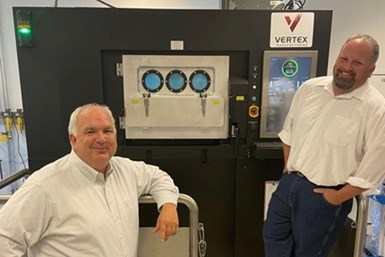Vertex Acquires 3D Printing Machine from Velo3D
Vertex Manufacturing is the first contract manufacturer to own a Velo3D system that processes the superalloy.
Share





Vertex Manufacturing’s Tim Warden (L) and Steve Rengers (R) with their Sapphire Inconel 718 additive manufacturing solution from Velo3D; they’ve just purchased a second one from Velo3D dedicated to Hastelloy-X. Photo Credit: Vertex Manufacturing
Vertex Manufacturing, a Cincinnati-based contract manufacturer, has purchased an end-to-end additive manufacturing (AM) solution from Velo3D Inc. — a Sapphire Hastelloy-X. Vertex is the first contract manufacturer to own a Velo3D system that processes this high-performance material.
Hastelloy-X is not a heat-hardened material, so it doesn’t become brittle at high temperatures, and its high oxidation resistance reportedly provides durability over many years of continuous use. “3D-printed Hast-X provides unique, robust, material qualities. Combining this with the fact that Vertex is AS9100 certified, it will allow us to help our customers take programs from development to production much quicker,” says Vertex’s vice president, Tim Warden.
According to the company, the Hast-X machine will allow it to support customers with specialized needs for high-temperature, high-pressure, long-lifetime applications in the aerospace and industrial gas turbine markets. “We chose Velo3D because we view this system as being a great fit for a number of applications that we couldn't build today with our current additive machines,” Warden says.
Vertex’s president, Steve Rengers, adds, “We’re going to continue to see product development cycles shorten as AM has a significant impact on reducing manufacturing times. This will be in defense-critical areas such as hypersonics as well as more traditional aerospace and aviation. We’re also seeing a lot of movement happening in areas such as alternative energy, remote-energy and the extension of human lifestyle quality through orthopedic implants.”
Related Content
-
In Moldmaking, Mantle Process Addresses Lead Time and Talent Pool
A new process delivered through what looks like a standard machining center promises to streamline machining of injection mold cores and cavities and even answer the declining availability of toolmakers.
-
Digitalization and Done-In-One Reign Supreme at BIEMH 2024
European manufacturers may have a different balance of markets than their U.S. counterparts, but the practical challenges they must overcome are often similar — as are the solutions.
-
Chuck Jaws Achieve 77% Weight Reduction Through 3D Printing
Alpha Precision Group (APG) has developed an innovative workholding design for faster spindle speeds through sinter-based additive manufacturing.






















